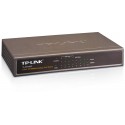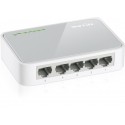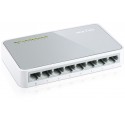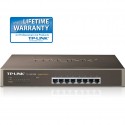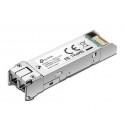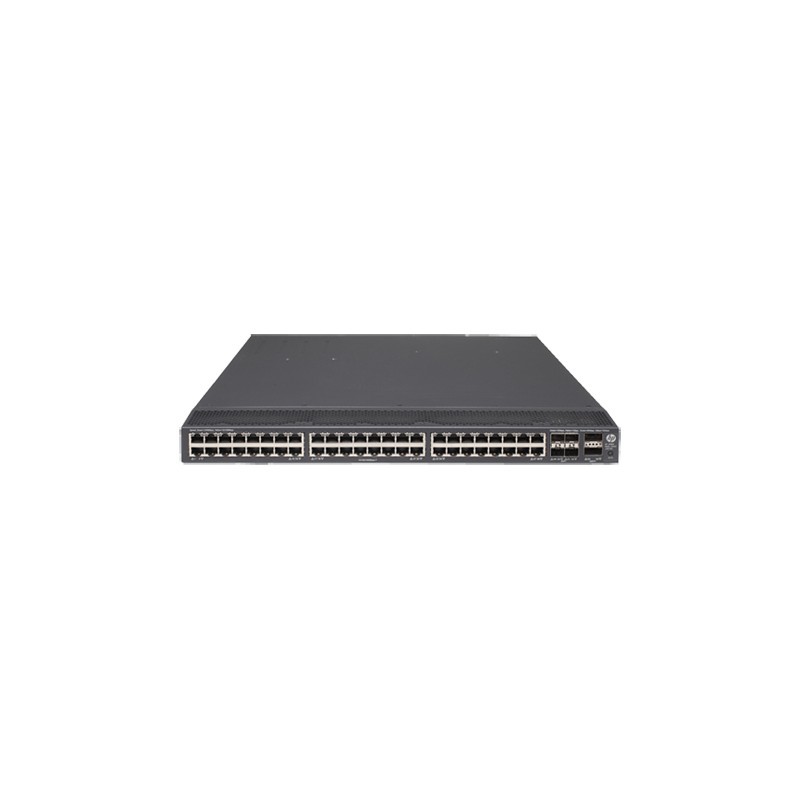
The HP 5900 Switch Series is a family of high-density, ultra-low-latency, top-of-rack (ToR) switches that is part of the HP FlexNetwork architecture's HP FlexFabric solution. Ideally suited for deployment at the server access layer of large enterprise data centers, the HP 5900 Switch Series is also powerful enough for deployment at the data center core layer of medium-sized enterprises.
With the increase in virtualized applications and server-to-server traffic, customers now require ToR switch innovations that will meet their needs for higher-performance server connectivity, convergence of Ethernet and storage traffic, the capability to handle virtual environments, and ultra-low-latency all in a single device.
Features
Quality of Service (QoS)
- Powerful QoS features: Flexible classification: creates traffic classes based on access control lists (ACLs), IEEE 802.1p precedence, IP, and DSCP or Type of Service (ToS) precedence; supports filter, redirect, mirror, remark, and logging. Feature support: provides support for Strict Priority Queuing (SP), Weighted Fair Queuing (WFQ), Weighted Deficit Round Robin (WDRR), SP+WDRR together, configurable buffers, Explicit Congestion Notification (ECN), and Weighted Random Early Detection (WRED).
Data center optimized
- Flexible high port density: the HP 5900 Switch Series enables scaling of the server edge with 1 GbE and 10GbE ToR deployments to new heights with high-density 48-port solutions delivered in a 1RU design; the high server port density is backed by 40 GbE QSFP+ uplinks to deliver the availability of needed bandwidth for demanding applications; each 40 GbE QSFP+ port can also be configured as four 10GbE ports by using a 40-GbE-to-10GbE splitter cable
- High-performance switching: cut-through and nonblocking architecture delivers low latency (~1 microsecond for 10GbE) for very demanding enterprise applications; the switch delivers high-performance switching capacity and wire-speed packet forwarding
- Higher scalability: HP Intelligent Resilient Framework (IRF) technology simplifies the architecture of server access networks; up to nine HP 5900 switches can be combined to deliver unmatched scalability of virtualized access layer switches and flatter two-tier networks using IRF, which reduces cost and complexity
- Advanced modular operating system: Comware v7 software's modular design and multiple processes bring native high stability, independent process monitoring, and restart; the OS also allows individual software modules to be upgraded for higher availability and supports enhanced serviceability functions like hitless software upgrades with single-chassis ISSU
- TRILL and EVB/VEPA: TRansparent Interconnection of Lots of Links (TRILL) is supported to increase the scale of enterprise data centers; Edge Virtual Bridging with Virtual Ethernet Port Aggregator (EVB/VEPA) provides connectivity into the virtual environment for a data center-ready environment
Manageability
- Full-featured console: provides complete control of the switch with a familiar CLI
- Troubleshooting: Ingress and egress port monitoring: enable network problem solving. Traceroute and ping: enable testing of network connectivity.
- Multiple configuration files: allow multiple configuration files to be stored to a flash image
- sFlow (RFC 3176): provides wire-speed traffic accounting and monitoring
- SNMP v1, v2c and v3: facilitate centralized discovery, monitoring, and secure management of networking devices
Resiliency and high availability
- HP Intelligent Resilient Framework (IRF) technology: enables an HP FlexFabric to deliver resilient, scalable, and secured data center networks for physical and virtualized environments; groups up to nine HP 5900 switches in an IRF configuration, allowing them to be configured and managed as a single switch with a single IP address; simplifies ToR deployment and management, reducing data center deployment and operating expenses
- IEEE 802.1w Rapid Convergence Spanning Tree Protocol: increases network uptime through faster recovery from failed links
- IEEE 802.1s Multiple Spanning Tree: provides high link availability in multiple VLAN environments by allowing multiple spanning trees
- Virtual Router Redundancy Protocol (VRRP): allows groups of two routers to dynamically back each other up to create highly available routed environments
- Hitless patch upgrades: allows patches and new service features to be installed without restarting the equipment, increasing network uptime and facilitating maintenance
With the increase in virtualized applications and server-to-server traffic, customers now require ToR switch innovations that will meet their needs for higher-performance server connectivity, convergence of Ethernet and storage traffic, the capability to handle virtual environments, and ultra-low-latency all in a single device.
Features
Quality of Service (QoS)
- Powerful QoS features: Flexible classification: creates traffic classes based on access control lists (ACLs), IEEE 802.1p precedence, IP, and DSCP or Type of Service (ToS) precedence; supports filter, redirect, mirror, remark, and logging. Feature support: provides support for Strict Priority Queuing (SP), Weighted Fair Queuing (WFQ), Weighted Deficit Round Robin (WDRR), SP+WDRR together, configurable buffers, Explicit Congestion Notification (ECN), and Weighted Random Early Detection (WRED).
Data center optimized
- Flexible high port density: the HP 5900 Switch Series enables scaling of the server edge with 1 GbE and 10GbE ToR deployments to new heights with high-density 48-port solutions delivered in a 1RU design; the high server port density is backed by 40 GbE QSFP+ uplinks to deliver the availability of needed bandwidth for demanding applications; each 40 GbE QSFP+ port can also be configured as four 10GbE ports by using a 40-GbE-to-10GbE splitter cable
- High-performance switching: cut-through and nonblocking architecture delivers low latency (~1 microsecond for 10GbE) for very demanding enterprise applications; the switch delivers high-performance switching capacity and wire-speed packet forwarding
- Higher scalability: HP Intelligent Resilient Framework (IRF) technology simplifies the architecture of server access networks; up to nine HP 5900 switches can be combined to deliver unmatched scalability of virtualized access layer switches and flatter two-tier networks using IRF, which reduces cost and complexity
- Advanced modular operating system: Comware v7 software's modular design and multiple processes bring native high stability, independent process monitoring, and restart; the OS also allows individual software modules to be upgraded for higher availability and supports enhanced serviceability functions like hitless software upgrades with single-chassis ISSU
- TRILL and EVB/VEPA: TRansparent Interconnection of Lots of Links (TRILL) is supported to increase the scale of enterprise data centers; Edge Virtual Bridging with Virtual Ethernet Port Aggregator (EVB/VEPA) provides connectivity into the virtual environment for a data center-ready environment
Manageability
- Full-featured console: provides complete control of the switch with a familiar CLI
- Troubleshooting: Ingress and egress port monitoring: enable network problem solving. Traceroute and ping: enable testing of network connectivity.
- Multiple configuration files: allow multiple configuration files to be stored to a flash image
- sFlow (RFC 3176): provides wire-speed traffic accounting and monitoring
- SNMP v1, v2c and v3: facilitate centralized discovery, monitoring, and secure management of networking devices
Resiliency and high availability
- HP Intelligent Resilient Framework (IRF) technology: enables an HP FlexFabric to deliver resilient, scalable, and secured data center networks for physical and virtualized environments; groups up to nine HP 5900 switches in an IRF configuration, allowing them to be configured and managed as a single switch with a single IP address; simplifies ToR deployment and management, reducing data center deployment and operating expenses
- IEEE 802.1w Rapid Convergence Spanning Tree Protocol: increases network uptime through faster recovery from failed links
- IEEE 802.1s Multiple Spanning Tree: provides high link availability in multiple VLAN environments by allowing multiple spanning trees
- Virtual Router Redundancy Protocol (VRRP): allows groups of two routers to dynamically back each other up to create highly available routed environments
- Hitless patch upgrades: allows patches and new service features to be installed without restarting the equipment, increasing network uptime and facilitating maintenance
| 10G support | Yes |
| AC input frequency | 50/60 Hz |
| AC input voltage | 100-240 V |
| Basic switching RJ-45 Ethernet ports quantity | 48 |
| Basic switching RJ-45 Ethernet ports type | Gigabit Ethernet (10/100/1000) |
| Colour of product | Grey |
| Depth | 460 mm |
| Flash memory | 512 MB |
| Form factor | 1U |
| Heat dissipation | 887 BTU/h |
| Height | 43.7 mm |
| Internal memory | 2048 MB |
| Latency (10 Gbps) | 1.5 µs |
| MAC address table | 128000 entries |
| Memory type | SDRAM |
| Networking standards | IEEE 802.3,IEEE 802.3ab,IEEE 802.3u |
| Packet buffer memory | 9 MB |
| Power consumption (typical) | 260 W |
| Quality of Service (QoS) support | Yes |
| Rack mounting | Yes |
| Switch layer | L3 |
| Switch type | Managed |
| Switching capacity | 336 Gbit/s |
| Throughput | 250 Mpps |
| Weight | 13000 g |
| Width | 439.9 mm |



